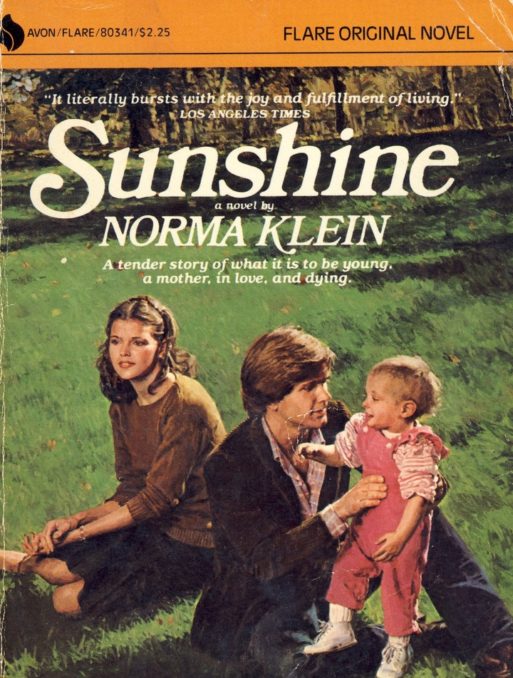“ Sunshine” by Norma Klein was published in 1974. It was loosely based on the true story of a young woman who died of cancer. During the last 18 months of her life, she made a series of audio tape recordings so that her baby daughter would have some idea of what her mother was like.
Sunshine” by Norma Klein was published in 1974. It was loosely based on the true story of a young woman who died of cancer. During the last 18 months of her life, she made a series of audio tape recordings so that her baby daughter would have some idea of what her mother was like.
The novel is told in first person from the point of view of Kate Hayden. At 18 years of age, Kate notices pain and swelling in her right knee. The only doctor she can afford is at a free clinic. He brushes off her concerns. One day, Kate’s leg gives way and she falls, dropping her baby, Jill. Kate’s boyfriend, Sam, borrows money from his parents so Kate can have a proper medical workup. The diagnosis is devastating: a rare form of cancer called osteogenic sarcoma. The cancer starts in the bone and often spreads to the lung.
The doctors recommend amputation, but Kate refuses. Instead, she goes through radiation and chemotherapy to try to control the tumor. Unfortunately, the chemotherapy has severe side effects. Kate decides to stop taking it, even though she knows it will hasten her death.
“Sunshine” is a realistic portrait of the thin line between life and death. In the following poem, Kate describes her rage at dying so young.
“Nighttime is overtaking me
As daylight falls behind
My life is slowly losing
The sparkle and the shine.
A life filled with promises
And empty bottles of wine
This loneliness is beginning to
Encloak me.
I’ve lost all sense of time.
Self-pity overwhelms me.
I’ve begun to lose my mind.
While death is overtaking me
And daylight falls behind.”

Credit: amolife.com
In other places in the novel, Kate writes about early death having a bizarre beauty.
Kate is simultaneously wise and foolish, caring and selfish, ecstatic and depressed. Her mood swings like a pendulum which causes trouble between her and her boyfriend. Sometimes she clings to Sam and can’t bear the thought of being alone. At other times, she wants nothing to do with him and tells him to go away and leave her alone. When he leaves, she is angry at him for going. Sam also has a hard time dealing with Kate’s decision to stop the chemotherapy. He feels that she is being selfish putting her quality of life ahead of him and Jill.
If you or a loved one is dealing with a life-limiting illness, you may find reading “Sunshine,” helpful. Unlike some books that portray the dying as serene and angel-like, Kate is honest about her faults as well as her strengths. Facing the end of life is never easy, but perhaps Kate’s journey will make your own experiences of grief seem a little more bearable.

 “Sunshine: A Novel” by Norma Klein
“Sunshine: A Novel” by Norma Klein



 Trans Remembrance Project Provides a Community of Grieving
Trans Remembrance Project Provides a Community of Grieving
 Caring for a Dying Loved One? Be Gentle With Yourself.
Caring for a Dying Loved One? Be Gentle With Yourself.














